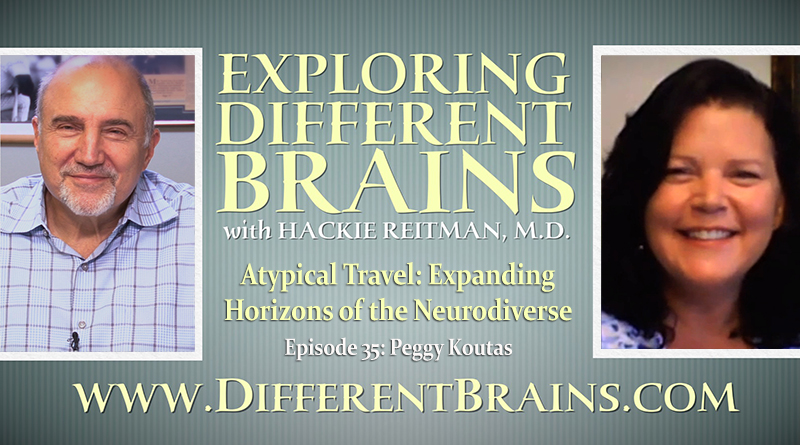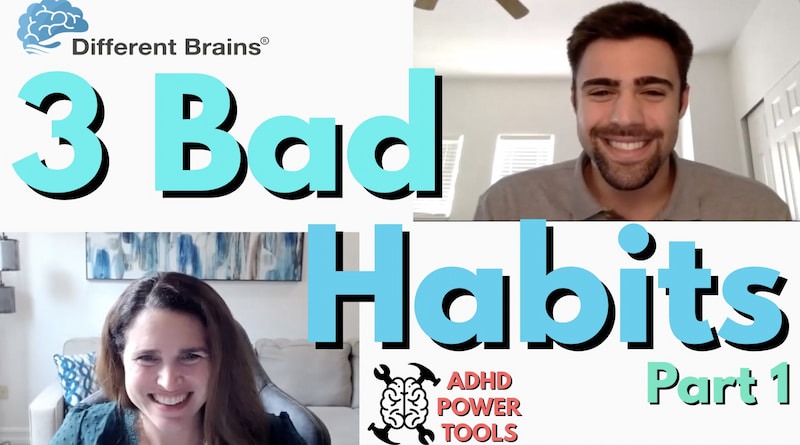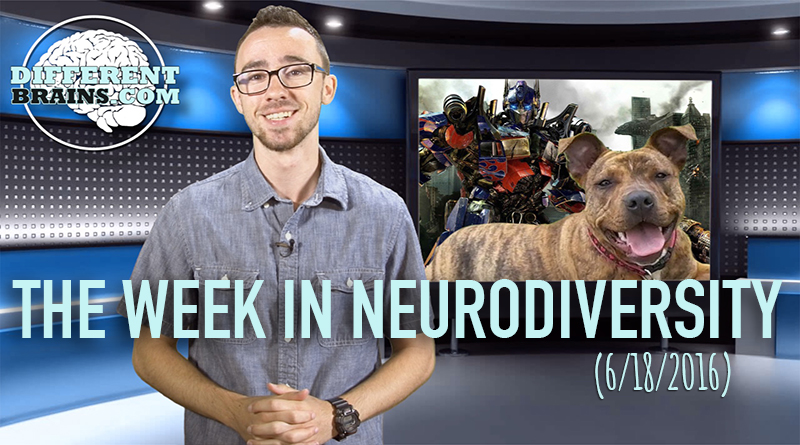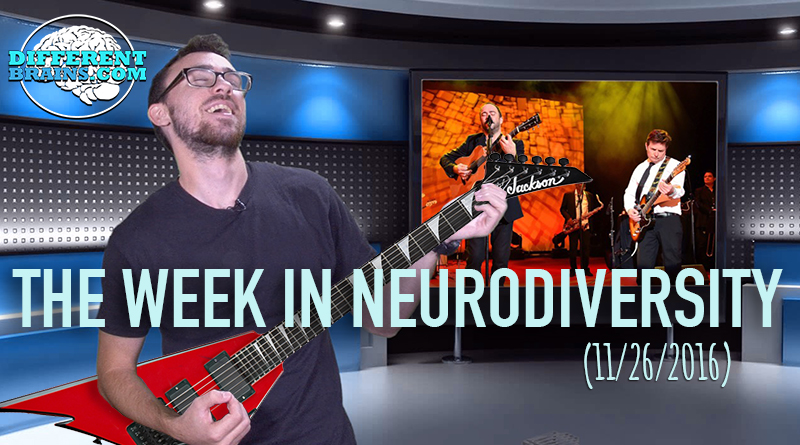
Atypical Travel: Expanding Horizons of the Neurodiverse with Peggy Koutas | EDB 35
In this episode, Harold Reitman, M.D. speaks with Peggy Koutas, founder of Atypical Travel. Peggy discusses her company’s goal of providing life-changing vacations to the neurodiverse, how educational goals can benefit from travel, and her own introduction to “different brains” through the Special Olympics.
For more about Atypical Travel, visit: www.atypicaltravel.org
or call (239) 699-4524
65 Second Preview:
To listen or download the podcast version of this episode, see the embedded player below.
Or look for us on your favorite podcast provider:
iTunes | Stitcher | SoundCloud
[expand title=”View Full Transcript”]
HACKIE REITMAN, M.D. (HR):
Hi welcome to another episode of Exploring Different Brains, I’m Dr. Hackie Reitman, and today we have the privilege of speaking with Peggy Koutas, and what she does, is that she makes travel extraordinary, and she’s got a company called Atypical Educational Travel. Welcome Peggy!
PEGGY KOUTAS (PK):
Thank you for having me. Good morning.
HR:
Good morning. Now why don’t you introduce yourself to our differentbrains.com audience here?
PK:
As you said my name is Peggy Koutas, I am the founder of Atypical Educational Travel. What we do basically is provide these extraordinary experiences for adults with diverse-abilities 18 and up. It is more than just going on vacation, which is good just as it is, but the intention is to make it a transformative experience for individuals who are just kind of branching into adulthood and that transition period of their life.
HR:
Okay, so what types of different kinds of brains would you say you have included in your travels?
PK:
If you’re talking about sort of that whole disability category, I don’t have any specific people that I include or exclude. The focus of the individuals who go on my trip, is all about what they’re passionate about. Are you passionate about making friends? Are you passionate about exploring the world? That’s our primary focus. My background is education, so I kind of have experience with every different type of individual and the challenges they might present. The key is the individual’s passion for life and desire to grow and learn.
HR:
You know that’s a very interesting segway for me a bit, because what we try to promote is that everybody should have the opportunity to try to pursue their passion and figure out how to make a living out of it. They might need some help and they might not. I think as a society we spend so much time saying what you can’t do, or you have to be like everybody else, instead of saying, “Hey what do you want to do?” Well you might have somebody who loves hiking, who wants to travel, who might have someone who wants to make friends. You might have someone explore the jungle. So what you’re saying is, that you and your company, you really tailor it to the individual.
PK:
Exactly. This all developed by my students when I was teaching in high school. They were excluded repeatedly. Groups would go out for spring break trips and long field trips with overnight experiences, and my students time and again were excluded from those things, regardless of whether they had the passion and the ability to do it. Simply because somewhere along the line, some doctor or some teacher had put them in a particular category and it had nothing to do with their ability to have a great experience and have that experience change their thought process and their sense of self, yet the individuals who have bullied my students, well they were free to go on the trips. So there was a lot of frustration that I felt along with those students, and that was the original intention of developing the company.
HR:
You know that’s great. I think that teachers and educators are the most undervalued important members of our society. Why don’t you say right now at the front end the name of the agency, how people get ahold of you, your website, your phone …
PK:
Perfect. The name of the company is Atypical Educational Travel, I can be found at www.atypicaltravel.org and my phone number is 239-699-4524, people can call they can text me, everything you know works with sort of the younger generation if they want to send me a text and ask me a question, that works great for me.
HR:
Well we’re talking with Peggy Koutas here who is very humble, she didn’t mention by the way her educational background. I think you have a little thing called a Ph.D. there? Tell us about your educational background and experience.
PK:
Well I will tell you I am this close to the Ph.D. My undergrad is in special education and my Master’s is in teacher leadership and then when I finish the Ph.D. it’ll be in adult education. So this is very much in line with what I’m doing with Atypical Travel. It’s in line with my doctorial focus, which is on transformative learning.
HR:
Now it’s my understanding you had to rare privilege of meeting our very own Charlie Lafferty and Matt Ryan at an event. Tell us the impressions that Matt and Charlie made on you.
PK:
I actually I was impressed with the fact that they were absolutely go-getters, they did a great job understanding that not every person needs the same thing, and they did a great job with that. It reminded me a lot of my very first employee Daniel, who is a former student of mine at a program called Elmhurst Learning Success Academy up in the Chicago area. He was my student for four years and when I needed to have sort of a community outreach person because I’m here in Florida and a lot of the travelers I have are coming from the Chicago area. I decided to hire Daniel as my first employee, that’s one of our goals at Atypical Travel is to have every employee sort of be in that diverse-abilities category and it’s been wonderful, and I saw a lot in your gentlemen that was similar to Daniel.
HR:
Well you know remind me, because I want to introduce you to a couple of great programs that are having, my friends at Royal Caribbean Cruise lines, Bill Baumgartner who is the senior vice president there, used to be like the admiral in charge of the Coast Guard down here and everything, he’s a great guy and they have some programs there, and also Carnival is getting into it, Bernie Dillon and his people there, so I forget, make sure — you probably already know of their program.
PK:
Well the cruise line actually and sort of doing the homework to discover the viability of starting a business like this you know because much of it is new. 30 years in the disability field, 15 of it in teaching, to take teaching completely outside of the classroom and start something that’s done in complete junction with the travel. There was a lot of homework that went into it and I was really pleased with what I discovered about the cruise industry in general. They have gone far beyond this compliance. We need to do certain things to be in compliance with ADA regulations. They saw individuals with different challenges, different diverse-abilities, not just as something that, “oh well we have to do this because we’ve been told to. They saw it as an opportunity to include those individuals and their families in the wonderful cruise industry. So they have really gone above and beyond.
HR:
Now what advice would you have for our viewers and listeners and readers who are thinking about traveling and might have certain trepidation because of previous experiences. Aside from the fact that they should get ahold of you, what’s a big takeaway they can take away from this regarding travel for the person whose brain might be a little bit different?
INTERVIWEE:
I deal with individuals who are ready to travel, semi-independently. These are people that, you know they love their families but how many 25-year-olds want to always go on vacation with their family? So this provides sort of a safety net for those individuals as well as the level of comfort for their families, but I would tell anyone if you’re traveling with a seven-year-old and they’re dealing with some different brain functions that that is a learning experience for them, it’s not just vacation. Encouraging them to do things that they wouldn’t do in their day-to-day life can be kind of scary and having people who care about you around during that time, that extends far beyond that vacation experience. If they can be reminded, “you know you were really scared when we did this when we were on vacation, and if you can do that, you can this thing that you’re scared about at school, or when you’re going out to do a job interview. The experience can be transformational if people intentionally have discussions about those scary, yet successful experiences and provide opportunities to reflect on those experiences.
HR:
Very well said. How do you feel society is moving right now in terms of neurodiversity? What is your subject of field, you’re over there in Marco Island?
PK:
I am.
HR:
Oh lucky you.
PK:
It’s beautiful.
HR:
Over there out there in the West Coast? Nice. How do you see things moving in society regarding neurodiversity, Peggy?
PK:
I think that everybody is moving in the right direction. I see a lot more of understanding and acceptance. When I first started out in the Chicago area, I was working at a group home, sort of your typical group home and I was primary assistant to an individual with autism, nonverbal, and it was wonderful. I had a great experience and I think he had a great experience or at least I hope so, it seemed like it, but at that time in the 80s when I told people what I did and said I worked with somebody who had autism, I had to then explain what autism was. That’s no longer the case, but I think everybody has heard the term autism, there is still a misunderstanding of what that means and I think that it’s important that we have discussions like this or we talk about how yes autism comes with certain challenges for that individual and for his family often, but it also means that there are parts of their brain that are just spectacular, and they are so fun and interesting that if people just take the time to get to know another person as an individual just like you would if you went out some place, let’s say you go out to happy hour and you talk to the people around you, you get to know them as people and you’re not instantly thinking that they have this label that’s been put on them. I think if we sort of forget about the terms that the medical community uses and think more about just getting to know the people, then that idea that we all bring certain benefits to society and can be valued for them, I think the world will be a better place, and it’s moving towards that, it’s just moving at different speeds in different regions.
HR:
Well that’s very well said, very well said. How did you first get into serving and trying to provide services for in general; you’ve been a teacher, you’ve had a great educational background now you’re into Atypical Educational Travel, how did you first get into all of that?
PK:
How did I first get into the disability field or how did I get into doing the educational adventures?
HR:
The educational, how did you get into the educational, which led into the intellectually disabled field?
PK:
Well I started out actually when I was 15 years old, long time ago, and well when it comes down to it, I got in trouble. I got in trouble in school, I suppose if I lived in a different age, I probably would have been considered having a behavior disorder, I was not the easiest student to have in class and at a time when you didn’t get community projects were not part of the graduation requirement, I was given an assignment of the dean of my high school to do community service because I had gotten in trouble, and just by chance I picked Special Olympics because I didn’t have to wake up early for it and it was close to my house, and I fell in love with it. It was a place where everybody was having a good time, everybody was accepted for who they are, they didn’t care what you look like or what clothes you wore and I really have never left the field since the very first experience. That has evolved over the years to going into education. I’ve taught middle school, I taught high school, public and private schools, therapeutic schools and then went into post-secondary education.
HR:
Great story. That’s my favorite part of the whole interview! When I was presenting out at the World Autism Conference in Tucson, the year before and listening to Temple Grandin say how one teacher changed her whole life and here one educator changed your life by the proper form of punishment which in my Aspertools book in the chapter on Rules, Rewards, and Consequences, I say you know you have to choose your consequences very carefully. You want it to have a positive effect, same as you want rewards something the individual likes, not something you like necessarily, but there was an excellent case of that individual who assigned you community service to the Special Olympics instead of just making you sit in a room and write your name a million times, and I remember my feeling that you described so well; I was lucky enough to give a keynote with Tim Shriver at the Special Olympics at the AADMD out in L.A. last summer and I have to say that experience was amazing to be at those medical tents and see everyone as you said, “everybody’s happy, everybody’s upbeat, everybody’s helping each other, with my hearing aids I saw the individuals for the first time in their lives at the medical tents get tested for hearing and actually fitted with hearing aids, glasses, and as I said to Tim Shriver, “I didn’t know until now that the Special Olympics was just a front to deliver great health care to a hundred different countries. It was very uplifting.
PK:
Wow. I think that you can never discount what one person or one experience can have as far as an impact on another person’s life, so that should be something that you should consciously be aware of, because you not only can have a positive impact on someone, you can also have a negative impact, so you know trying to do your best to be that positive person whether it be smiling at the tollbooth operator when you pay your toll, or you know saying hello to somebody in the grocery line, or creating something much larger like Atypical Travel, like Different Brains, the goal is always to have that positive impact and have other people have those transformational experience, just like someone else did for me.
HR:
Well listen Peggy, it’s great to meet you, and I’m so glad that when you were 15 ten years ago that you had that experience that got you into all of this. I think it’s great.
PK:
I thank you. Thank you for having me.
[/expand]
This video is owned by Different Brains Inc, kindly donated by it’s original producer PCE Media LLC.
Different Brains® Inc. founder Harold “Hackie” Reitman, M.D. is an author, filmmaker, retired orthopedic surgeon, former professional heavyweight boxer, the past chairman and president (and current board member) of The Boys and Girls Clubs of Broward County, and a neurodiversity advocate. However, it was his role as a father that led to the creation of the DifferentBrains.org website.
Hackie’s daughter Rebecca grew up with epilepsy, 23 vascular brains tumors, and underwent 2 brain surgeries before the age of 5. Her struggles and recovery put him on the road to, through 26 professional heavyweight boxing matches, raising money for children’s charities (to which he donated every fight purse).
Rebecca eventually went on to graduate from Georgia Tech with a degree in Discrete Mathematics, and Dr. Reitman wrote and produced a film based on her experiences there (The Square Root of 2, starring Darby Stanchfield of ABC’s Scandal). After graduation, Rebecca received a diagnosis of Asperger’s syndrome. Hackie, shocked at his own ignorance of the topic despite being an M.D., embarked on years of research that culminated with his book Aspertools: The Practical Guide for Understanding and Embracing Asperger’s, Autism Spectrum Disorders, and Neurodiversity (released by HCI books, publishers of the Chicken Soup for the Soul series).
This experience revealed to Hackie the interconnectedness of the conditions that fall under the neurodiversity umbrella, while alerting him to the in-fighting and fractured relations that often plague the organizations tasked with serving the community. Convinced that overcoming these schisms could help all of society, Hackie forged the Different Brains philosophy of inclusive advocacy: “Supporting Neurodiversity – From Autism to Alzheimer’s and All Brains In Between”.
In the company’s initial years of operation, Hackie self-financed all of the content on DifferentBrains.org, all of which offered free to view to the public. Currently he is the host of our weekly interview show Exploring Different Brains, writes blogs for the site, and tours the country speaking at conferences, conventions and private functions, all with the goal of improving the lives of neurodiverse individuals and their families, and maximizing the potential of those with different brains. Separate from Different Brains, Hackie is the founder and CEO of PCE Media, a media production company focusing on reality based content. He recently co-executive produced the documentary “Foreman”, the definitive feature documentary on legendary boxer and pitchman George Foreman.




